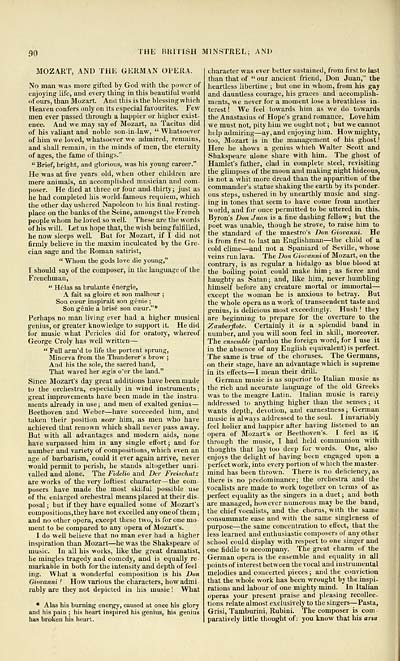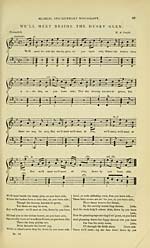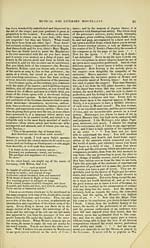Glen Collection of printed music > Printed music > British minstrel, and musical and literary miscellany
(98) Page 90
Download files
Complete book:
Individual page:
Thumbnail gallery: Grid view | List view

90
THK KRIIFSH MINSTREL; AND
MOZART, AND THE GERMAN OPERA.
No man was more gifted by God with the power of
enjoying life, and every thing in this beautiful world
of ours, than Mozart. And tliis is the blessing which
Heaven confers only on its especial favourites. Few
men ever passed through a happier or higher exist-
ence. And we may say of Mozart, as Tacitus did
of his valiant and noble son-in-law, " Whatsoever
of him we loved, whatsoever we admired, remains,
and shall remain, in the minds of men, the eternity
of ages, the fame of things."
"Brief, bright, and glorious, was his young career."
He was at five years old, when other children are
mere animals, an accomplished musician and com-
poser. He died at three or four and-thirty; just as
he had completed his world-famous requiem, which
the other day ushered Napoleon to his final resting-
place on the banks of the Seine, amongst the French
people whom he loved so well. These are the words
of his will. Let us hope that, the wish being fulfilled,
he now sleeps welL But for Mozart, if I did not
firmly believe in the maxim inculcated by the Gre-
cian sage and the Roman satirist,
" Whom the gods love die young,"
I should say of the composer, in the language of the
Frenchman,
" H^las aa brulante energie,
A fait sa gloire et son malheur ;
Son coeur inspirait son genie ;
Son gSnie a bris^ son coeur."*
Perhaps no man living ever had a higher musical
genius, or greater knowledge to support it. He did
for music what Pericles did for oratory, whereof
George Croly has well written —
" Full arm'd to life the portent sprung,
Minerva from the Thunderer's brow ;
And his the sole, the sacred hand,
That waved her segis o'er the land."
Since Mozart's day great additions have been made
to the orchestra, especially in wind instruments;
great improvements have been made in the instru-
ments already in use; and men of exalted genius —
Beethoven and Weber — have succeeded him, and
taken their position iiaar him, as men who have
achieved that renown which shall never pass away.
But with all advantages and modern aids, none
have surpassed him in any single eft'ort ; and for
number and variety of compositions, which even an
age of barbarism, could it ever again arrive, never
would permit to perish, he stands altogether unri-
valled and alone. The Fidelia and Der Freischutz
are works of the very loftiest character — the com-
posers have made the most skilful possible use
of the enlarged orchestral means placed at their dis-
posal ; but if they have equalled some of Mozart's
compositions,they have not excelled any oneof them;
and no other opera, except these two, is for one mo-
ment to be compared to any opera of Mozart's.
I do well believe that no man ever had a higher
inspiration than Mozart — he was the Shakspeare of
music. In all his works, like the great dramatist,
he mingles tragedy and comedy, and is equally re-
markable in both for the intensity and depth of feel-
ing. What a wonderful composition is his Don
Giovanni ! How various the characters, how admi-
rably are they not depicted in his music ! What
♦ Alas his burning energy, caused at once his glory
and his pain ; his heart inspired his genius, his genius
has broken his heart.
character was ever better sustained, from first to last
than that of " our ancient friend, Don Juan," the
heartless libertine ; but one in whom, from his gay
and dauntless courage, his graces and accomplish-
ments, we never for a moment lose a breathless in-
terest ! We feel towards him as we do towards
the Anastasius of Hope's grand romance. Love him
we must not, pity him we ought not ; but we cannot
help admiring — ay, and enjoying him. How mighty,
too, Mozart is in the management of his ghost J
Here he shows a genius which Walter Scott and
Shakspeare alone share with him. The ghost of
Hamlet's father, clad in complete steel, revisiting
the glimpses of the moon and making night hideous,
is not a whit more dread than the apparition of the
commander's statue shaking the earth by its ponder-
ous steps, ushered in by unearthly music and sing-
ing in tones that seem to have come from another
world, and for once permitted to be uttered in this.
Byron's Don Juan is a fine dashing fellow; but the
poet was unable, though he strove, to raise him to
the standard of the maestro's Doti Giovanni. He
is from first to last an Englishman — the child of a
cold clime — and not a Spaniard of Seville, whose
veins run lava. The Don Giovanni of Mozart, on the
contrary, is as regular a hidalgo as blue blond at
the boiling point could make him ; as fierce and
haughty as Satan; and, like him, never humbling
himself before any creature mortal or immortal —
except the woman he is anxious to betray. But
the whole opera as a work of transcendent taste and
genius, is delicious most exceedingly. Hush ! they
are beginning to prepare for the overture to the
Zauberflote. Certainly it is a splendid band in
number, and you will soon feel in skill, moreover.
The ensemble (pardon the foreign word, for 1 use it
in the absence of any English equivalent) is perfect.
The same is true of the choruses. The Germans,
on their stage, have an advantage which is supreme
in its effects — I mean their drill.
German music is as superior to Italian music as
the rich and accurate language of the old Greeks
was to the meagre Latin. Italian music is rarely
addressed to anything higher than the senses; it
wants depth, devotion, and earnestness; German
music is always addressed to the soul. I invariably
feel holier and happier after having listened to an
opera of Mozart's or Beethoven's. I feel as it
through the music, I had held communion with
thoughts that lay too deep for words. One, also
enjoys the delight of having been engaged upon a
perfect work, into every portion of w hich the master-
mind has been thrown. There is no deficiency, as
there is no predominance; the orchestra and the
vocalists are made to work togetlier on terms of as
perfect equality as the singers in a duet ; and both
are managed, however numerous may be the band,
the chief vocalists, and the chorus, with the same
consummate ease and with the same singleness of
purpose — the same concentration to efi'ect, that the
less learned and enthusiastic composers of any other
school could display with respect to one singer and
one fiddle to accompany. The great charm of the
German opera is the ensemble and equahty in all
points of interest between the vocal and instrumental
melodies and concerted pieces ; and the conviction
that the whole work has been wrought by the inspi-
rations and labour of one mighty mind. In Italian
operas your present praise and pleasing recollec-
tions relate almost exclusively to the singers — Pasta,
Grisi, Tamburini, Ruhini. The composer is com
paratively little thought of: you know that his aria
THK KRIIFSH MINSTREL; AND
MOZART, AND THE GERMAN OPERA.
No man was more gifted by God with the power of
enjoying life, and every thing in this beautiful world
of ours, than Mozart. And tliis is the blessing which
Heaven confers only on its especial favourites. Few
men ever passed through a happier or higher exist-
ence. And we may say of Mozart, as Tacitus did
of his valiant and noble son-in-law, " Whatsoever
of him we loved, whatsoever we admired, remains,
and shall remain, in the minds of men, the eternity
of ages, the fame of things."
"Brief, bright, and glorious, was his young career."
He was at five years old, when other children are
mere animals, an accomplished musician and com-
poser. He died at three or four and-thirty; just as
he had completed his world-famous requiem, which
the other day ushered Napoleon to his final resting-
place on the banks of the Seine, amongst the French
people whom he loved so well. These are the words
of his will. Let us hope that, the wish being fulfilled,
he now sleeps welL But for Mozart, if I did not
firmly believe in the maxim inculcated by the Gre-
cian sage and the Roman satirist,
" Whom the gods love die young,"
I should say of the composer, in the language of the
Frenchman,
" H^las aa brulante energie,
A fait sa gloire et son malheur ;
Son coeur inspirait son genie ;
Son gSnie a bris^ son coeur."*
Perhaps no man living ever had a higher musical
genius, or greater knowledge to support it. He did
for music what Pericles did for oratory, whereof
George Croly has well written —
" Full arm'd to life the portent sprung,
Minerva from the Thunderer's brow ;
And his the sole, the sacred hand,
That waved her segis o'er the land."
Since Mozart's day great additions have been made
to the orchestra, especially in wind instruments;
great improvements have been made in the instru-
ments already in use; and men of exalted genius —
Beethoven and Weber — have succeeded him, and
taken their position iiaar him, as men who have
achieved that renown which shall never pass away.
But with all advantages and modern aids, none
have surpassed him in any single eft'ort ; and for
number and variety of compositions, which even an
age of barbarism, could it ever again arrive, never
would permit to perish, he stands altogether unri-
valled and alone. The Fidelia and Der Freischutz
are works of the very loftiest character — the com-
posers have made the most skilful possible use
of the enlarged orchestral means placed at their dis-
posal ; but if they have equalled some of Mozart's
compositions,they have not excelled any oneof them;
and no other opera, except these two, is for one mo-
ment to be compared to any opera of Mozart's.
I do well believe that no man ever had a higher
inspiration than Mozart — he was the Shakspeare of
music. In all his works, like the great dramatist,
he mingles tragedy and comedy, and is equally re-
markable in both for the intensity and depth of feel-
ing. What a wonderful composition is his Don
Giovanni ! How various the characters, how admi-
rably are they not depicted in his music ! What
♦ Alas his burning energy, caused at once his glory
and his pain ; his heart inspired his genius, his genius
has broken his heart.
character was ever better sustained, from first to last
than that of " our ancient friend, Don Juan," the
heartless libertine ; but one in whom, from his gay
and dauntless courage, his graces and accomplish-
ments, we never for a moment lose a breathless in-
terest ! We feel towards him as we do towards
the Anastasius of Hope's grand romance. Love him
we must not, pity him we ought not ; but we cannot
help admiring — ay, and enjoying him. How mighty,
too, Mozart is in the management of his ghost J
Here he shows a genius which Walter Scott and
Shakspeare alone share with him. The ghost of
Hamlet's father, clad in complete steel, revisiting
the glimpses of the moon and making night hideous,
is not a whit more dread than the apparition of the
commander's statue shaking the earth by its ponder-
ous steps, ushered in by unearthly music and sing-
ing in tones that seem to have come from another
world, and for once permitted to be uttered in this.
Byron's Don Juan is a fine dashing fellow; but the
poet was unable, though he strove, to raise him to
the standard of the maestro's Doti Giovanni. He
is from first to last an Englishman — the child of a
cold clime — and not a Spaniard of Seville, whose
veins run lava. The Don Giovanni of Mozart, on the
contrary, is as regular a hidalgo as blue blond at
the boiling point could make him ; as fierce and
haughty as Satan; and, like him, never humbling
himself before any creature mortal or immortal —
except the woman he is anxious to betray. But
the whole opera as a work of transcendent taste and
genius, is delicious most exceedingly. Hush ! they
are beginning to prepare for the overture to the
Zauberflote. Certainly it is a splendid band in
number, and you will soon feel in skill, moreover.
The ensemble (pardon the foreign word, for 1 use it
in the absence of any English equivalent) is perfect.
The same is true of the choruses. The Germans,
on their stage, have an advantage which is supreme
in its effects — I mean their drill.
German music is as superior to Italian music as
the rich and accurate language of the old Greeks
was to the meagre Latin. Italian music is rarely
addressed to anything higher than the senses; it
wants depth, devotion, and earnestness; German
music is always addressed to the soul. I invariably
feel holier and happier after having listened to an
opera of Mozart's or Beethoven's. I feel as it
through the music, I had held communion with
thoughts that lay too deep for words. One, also
enjoys the delight of having been engaged upon a
perfect work, into every portion of w hich the master-
mind has been thrown. There is no deficiency, as
there is no predominance; the orchestra and the
vocalists are made to work togetlier on terms of as
perfect equality as the singers in a duet ; and both
are managed, however numerous may be the band,
the chief vocalists, and the chorus, with the same
consummate ease and with the same singleness of
purpose — the same concentration to efi'ect, that the
less learned and enthusiastic composers of any other
school could display with respect to one singer and
one fiddle to accompany. The great charm of the
German opera is the ensemble and equahty in all
points of interest between the vocal and instrumental
melodies and concerted pieces ; and the conviction
that the whole work has been wrought by the inspi-
rations and labour of one mighty mind. In Italian
operas your present praise and pleasing recollec-
tions relate almost exclusively to the singers — Pasta,
Grisi, Tamburini, Ruhini. The composer is com
paratively little thought of: you know that his aria
Set display mode to: Large image | Transcription
Images and transcriptions on this page, including medium image downloads, may be used under the Creative Commons Attribution 4.0 International Licence unless otherwise stated. ![]()
| Special collections of printed music > Glen Collection of printed music > Printed music > British minstrel, and musical and literary miscellany > (98) Page 90 |
|---|
| Permanent URL | https://digital.nls.uk/91436121 |
|---|
| Description | Scottish songs and music of the 18th and early 19th centuries, including music for the Highland bagpipe. These are selected items from the collection of John Glen (1833 to 1904). Also includes a few manuscripts, some treatises, and other books on the subject. |
|---|
| Description | The Glen Collection and the Inglis Collection represent mainly 18th and 19th century Scottish music, including Scottish songs. The collections of Berlioz and Verdi collected by bibliographer Cecil Hopkinson contain contemporary and later editions of the works of the two composers Berlioz and Verdi. |
|---|

